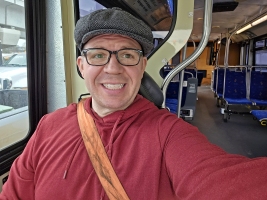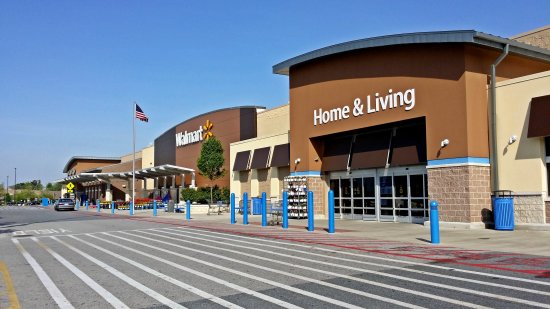Preserve community heritage, and keep names local…
July 23, 2015, 3:23 PM
In the wake of the June 17 church shooting in Charleston, South Carolina, a movement has come up to remove things related to the Confederacy from places of honor, and relegate them to history.
That said, if things go that way, a lot of things named for people who fought for the Confederacy will be up for renaming soon. Among other things, there is discussion about renaming Jefferson Davis Highway in Virginia. In addition, there has been longstanding discussion in Staunton, Virginia about renaming the city’s public high school, currently named for Robert E. Lee, if it moves from its current, dated building to a new building on a different site.
Now as far as I’m concerned, history is where the Confederacy belongs. I mean, the south lost the Civil War 150 years ago. It’s time that people stopped fighting it, already. However, when it comes to naming places for people, there are different ways to go about it. One way is to name things for a prominent national figure, either current or historical, and the other is to search for someone with a direct connection to the area. If the title of the post didn’t give it away, I support the latter more than the former.
As I see it, naming places and things after national figures represents the Walmartification of our history and our communities. What do I mean by this? Take this Walmart store, for example:
Without any other context, I’d imagine that you would be hard-pressed to figure out where this store is located. It could literally be anywhere. This could be the Walmart in your town. Or the next town over. Or in the next county. Or, for all you know, it could be halfway across the country. (Spoiler: it’s in Laurel, Maryland. But you get my drift.)
Same goes for names. If you name a place after a president or another national figure, there is nothing that sets you apart from all of the other places that are named for that same national figure. For instance, there are 16 different high schools in 13 different states named for Thomas Jefferson. Likewise, there are 26 different high schools in 16 different states named for John F. Kennedy. I would bet that in most of the examples for both Jefferson and Kennedy, these people had no actual connection to these places. For instance, I’m guessing that Thomas Jefferson never visited San Antonio, Texas or otherwise did anything in connection with the town. Now there’s nothing inherently wrong with naming a place after a national figure. It’s a name for a place. However, these names for national figures don’t have much character to them. It’s as if they pulled a name out of a hat. One could imagine that such places could just as easily have been named for George Washington, Franklin Roosevelt, or another president.
It’s also why I found it laughable that while I was a student at James Madison University from 1999-2003, there was a push by the administration to strengthen the connections between the former president and the university that bears his name. After all, President Madison had been dead for more than a century when the college was named for him. The university had no connection to Madison other than a name. I always thought that the statue of James Madison that was installed on campus in 2002 seemed a bit out of place. However, the names of many of the buildings on campus reflected the institution itself, rather than an imagined connection to an historical figure. The library was named for a university president, “Uncle” Ronald Carrier. The business building was named for Zane Showker, a local businessman who donated money to many causes, including the university. And likewise, the university’s athletic program used the name “Dukes”, which was in honor of the university’s second president, Samuel Page Duke.
Place names are really what puts a town on the map. Any town can have a school named for a national figure who had no local connection. It also takes away an opportunity to honor an upstanding local citizen who may not be very well known outside the town, but who nonetheless left their mark on the town. For instance, my old elementary school in Rogers, Arkansas is named for Bonnie Grimes, a local educator, i.e. someone from the town who left a mark on the city’s schools. The school system could have easily named the school for a president or someone else, but they chose a local educator. Thus the name itself becomes a lesson in local history, by bringing attention to a prominent local citizen. It becomes something distinct to Rogers. When you think of Bonnie Grimes Elementary, Rogers, Arkansas immediately comes to mind, because it’s unique to the town. Name it after George Washington or another national figure, and the name could be in any town.
I think the only reason that national figures get the names so often is because it’s easy to do. Everyone knows who these people were, and the name doesn’t require much explaining, nor does it require any research. And you end up getting the town that you deserve, full of generic place names that you could find in any town, with no emphasis on the community. Naming something after a member of the community requires more work, since the people being honored are not necessarily household names. Thus they require more research to identify, and more work to explain the significance of these people in the modern era. But it’s worth it because you end up with something that is unique to the community.
As of late, I’ve noticed that many jurisdictions have named some sort of thoroughfare for civil rights leader Dr. Martin Luther King. On its face, it seems sound enough: we want to recognize the struggle for equal rights, and so who better than Dr. King, perhaps one of the most recognizable public faces of the movement. Harrisonburg, Virginia did exactly that, renaming Cantrell Avenue for Dr. King in 2013. Aside from the idea of eliminating the name of a major roadway that has a strong association with Harrisonburg, even if the origins of the “Cantrell” name are not completely understood, it fails to recognize any contributions from local citizens to the issue of civil rights. Don’t get me wrong, though: I’m not trying to downplay any of King’s contributions to the issue of civil rights, and King did great work in that area. But I thought that they could have done more to spotlight the city’s own history. Carrier Library at JMU has a work entitled Integration: the African American experience in Harrisonburg, Virginia in its collection. Perhaps that could have been used to help determine a person to recognize regarding civil rights, and spotlight their contribution to civil rights in Harrisonburg.
I guess what I’m getting at is that the identity of a community should be rooted in that community. Recognizing community members when it’s time to determine place names, and not contributing to the Walmartification of our history and cities by only naming for national figures, is something that more places should do. By keeping names local, it emphasizes a community’s own rich heritage, and that’s worth preserving.
Categories: JMU, State and local politics











